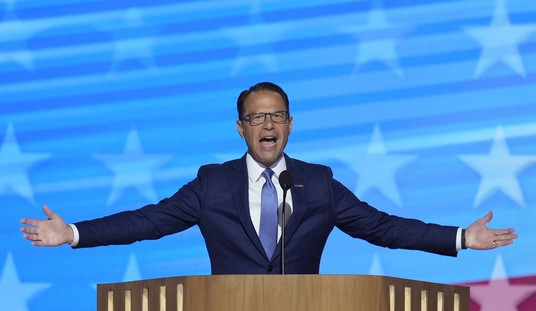Via Mickey Kaus, I glossed over this in yesterday’s post but I shouldn’t have. What happens if, as everyone but everyone expects, DHS can’t meet the Gang of Eight’s security targets at the border after five years?
Magical things, my friends:
[I]n a delicate compromise worked out over weeks of negotiations, the bill avoids any hard hurdles related to border enforcement that could eventually halt the progress of those immigrants on a pathway to citizenship…
If, after five years, border officials have not reached the surveillance and enforcement goals [i.e. catching or repelling 90% of attempted border-crossers], the bill creates and finances a border commission, made up of officials from border states and other experts, to help the Department of Homeland Security reach its goals…
At the end of 10 years, officials must show that the border security plan is operational, the fence is completed, and the worker verification and visa exits systems are operating. At that point, immigrants in provisional status will be allowed to apply for green cards.
If there’s one thing you can count on in Washington, it’s a bipartisan commission succeeding where all else has failed. Question one: If the Gang thinks DHS is so likely to fail at enforcement (which, in fairness, it is) that they’re already providing money for an emergency commission to help rescue it after five years, why not just establish the commission now? Or better yet, why not hold a bunch of hearings right now to pick the brains of “officials from border states and other experts” so that DHS has the expertise it needs before a bill is passed? You know why: The longer the process drags out, the more skittish key constituencies will get about the bill and the greater the risk will be that it’ll fail. (That’s why Pat Leahy and Democrats don’t want more than a single token hearing after the recess in early May.) Installing a commission after five more years of security failures sounds to me like something designed to take political heat off of DHS rather than something that’ll help significantly with border improvements. Without the commission, the public would grow restless after five years and demand explanations from Homeland Security on why they can’t tighten the border even with a bipartisan congressional mandate. The Gang’s anticipating that and, to head off the restlessness, providing a preemptive “solution.” No need to panic if DHS is dragging its feet. There’ll be a commission by 2018 to “help” them out, i.e. buy them another five years of public patience to see if they can make any headway at the border.
Question two: What happens after 10 years if the border’s still not secure? Another commission? No one on either side seriously believes that Democrats will continue to hold the path to citizenship in abeyance at that point simply because DHS can’t get its act together. In reality, there is no true border security “trigger” here. Homeland Security gets 10 years to give its best efforts. If it miraculously succeeds before those 10 years are up, then the citizenship process is triggered early. If it fails, then Democrats and Republicans (in the name of Latino outreach) will huddle and agree to let the green-card process begin immediately irrespective of security conditions. If you don’t believe me, believe the Democratic members of the Gang:
Sens. Chuck Schumer (N.Y.), Bob Menendez (N.J.), Dick Durbin (D-Ill.) and Michael Bennet (Colo.) disputed a report in Wednesday’s Wall Street Journal that the immigrants would have to wait until law enforcement officials are stopping 90 percent of people crossing the Southern border.
According to Democratic sources briefed on the legislation, the Department of Homeland Security would need to implement a plan that achieves the 90 percent apprehension rate, but the rate itself is not a trigger and a barrier to the pathway for citizenship.
The Democratic Senate negotiators didn’t provide a detailed description to the [Congressional] Hispanic Caucus, instead asking that the members trust them.
“We told them when we first met with them you have the last word, and we started this meeting with them saying exactly the same thing,” Durbin told reporters. “We need to have your approval.”
Exit question: Why does the Congressional Hispanic Caucus have “the last word” on U.S. border enforcement and normalization of illegals?







Join the conversation as a VIP Member